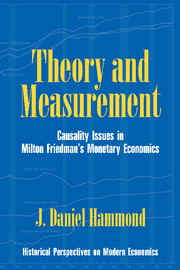Book contents
- Frontmatter
- Contents
- Acknowledgments
- Introduction
- 1 Theory and Measurement at the National Bureau
- 2 Origins of Friedman's Marshallian Methodology
- 3 Origins of the Monetary Project
- 4 Critiques from Within the National Bureau
- 5 Post Hoc Ergo Propter Hoc: Part I
- 6 Reactions to the Monetary History
- 7 Post Hoc Ergo Propter Hoc: Part II
- 8 Friedman and His Critics on the Theoretical Framework
- 9 The Great Depression
- 10 Measurement without Measurement: Hendry and Ericsson's Critique
- Conclusion
- Appendix
- Bibliography
- Index
9 - The Great Depression
Published online by Cambridge University Press: 16 September 2009
- Frontmatter
- Contents
- Acknowledgments
- Introduction
- 1 Theory and Measurement at the National Bureau
- 2 Origins of Friedman's Marshallian Methodology
- 3 Origins of the Monetary Project
- 4 Critiques from Within the National Bureau
- 5 Post Hoc Ergo Propter Hoc: Part I
- 6 Reactions to the Monetary History
- 7 Post Hoc Ergo Propter Hoc: Part II
- 8 Friedman and His Critics on the Theoretical Framework
- 9 The Great Depression
- 10 Measurement without Measurement: Hendry and Ericsson's Critique
- Conclusion
- Appendix
- Bibliography
- Index
Summary
Introduction
In this chapter we review the debate set off by Chapter 7 of Friedman and Schwartz's Monetary History. “The Great Contraction” marked a watershed in thinking about the greatest economic calamity in modern times. Until Friedman and Schwartz provoked the interest of economists by rehabilitating monetary theory and history, neither economic theorists nor economic historians devoted as much attention to the Depression as historians.
Macroeconomists' time-series econometric methods do not allow them to attach importance to individual historical episodes. From their perspective the Depression appeared more an econometric problem to be circumvented than a puzzle to be understood. One of the key assumptions in time-series estimation of economic structure is that the structure remains unchanged through the period covered by the econometrician’. Common sense suggested that the Depression, and the new government presence in economic and business affairs from President Roosevelt' New Deal and World War II, marked a point at which the structure of the U.S. economy was likely to have changed. This econometric problem, plus the greater urgency attached to understanding the contemporary economy in the heyday of the “New Economics” of the 1960s, suggested that the most appropriate data for econometricians was postwar quarterly data.
For the economic historians, the contraction of 1929–33 was too recent to hold much interest. Time would have to pass for the Depression to become history. The topics getting the most attention from economic historians in the 1950s were business, labor, and manufacturing history.
- Type
- Chapter
- Information
- Theory and MeasurementCausality Issues in Milton Friedman's Monetary Economics, pp. 166 - 186Publisher: Cambridge University PressPrint publication year: 1996



